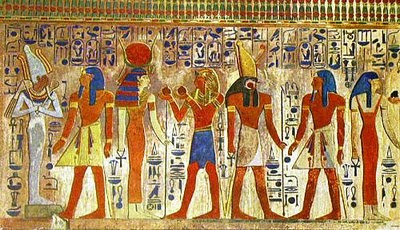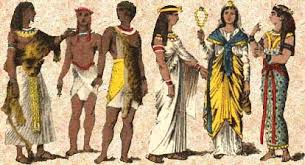|
The vast majority of Egypt's inhabitants live in
the Nile valley and delta, and the rest of the country (about 96%
of Egypt's total land area) is sparsely populated. Most modern
Egyptians are of a complex ethnic mixture, being descended from the
ancient Egyptians, Berbers, sub-Saharan Africans, Arabs, Greeks,
and Turks. Arabic is the official language; many educated Egyptians
also speak English and French. About 90% of the people are Sunni
Muslims, and most of the rest are Coptic Christians
Visitors to Egypt are often surprised by the variety of types to be
encountered in the course of the shortest stroll through Cairo
streets. Already on landing at Alexandria or Port Said he will have
observed the blue-clad porters at the docks, the uniformed port
officials and, perhaps, the turbaned fishermen setting out to sea
in their primitive sailing boats. On the way to the station he will
have noticed the white-clad policeman directing the traffic and,
from the windows of his Pullmann car, he will have seen, hard at
work in the fertile fields, the peasant -"fellah" -worker who
constitutes the backbone of the Egyptian population.

In the capital the variety of types seems almost bewildering. From
any hotel terrace or window the visitor is likely to see, in the
space of a few short minutes, such different types as the Beduin
with his white headdress and the knotted cord which keeps it in
place; the fashionable lady in the latest Paris creation; the woman
of the people wearing with regal carriage her unassuming black wrap
and heavy veil; the artisan in tarboush or turban, gown or European
clothes; the dignified and stately alim (Moslem preacher or
professor) in flowing robes and snow-white turban; and of course,
the well-dressed, highly civilised representatives of the modern
country which Ancient Egypt has become. Yet, on closer
acquaintance, it will be found that these types apparently so
diverse, offer as many points of resemblance as of contrast. One
language and, to a great extent, one religion are common to all. On
even closer acquaintance the resemblances are accentuated while
dissemblances diminish. Salient characteristics of every Egyptian
are the love of the soil from which he springs, his innate sense of
courtesy and hospitality, his love of little children and his
veneration for old age. These are strong bonds and they intensify
the feeling of brotherhood which, if not peculiar to Egypt, is
certainly an outstanding part of her life.W

Egypt inhabitants directly engaged in
agriculture. Many of these are what, in other lands, would be known
as peasant proprietors. Large landowners in Egypt are comparatively
few. By far the greater part of the cultivable land is divided and
sub-divided into small holdings and the fertility of the soil gives
these tiny farms and fields a conside rable capital value.
Simple, hard-working, frugal in his
tastes, the Egyptian fellah (pl. fellahin) has much in common with
peasants in other parts of the world. But the peculiarities of
Egyptian agriculture, the lacl, of rainfall and the fact that one
river is the mainstay of his crops has given him characteristics of
his own and a special knowledge which is amazing in its extent and
degree. It is the considered opinion of many experts qualified. to
judge that the Egyptian farmer is unsurpassed in the technical
skill which he brings to bear on his daily labour. From the
smallest plot of soil he will extract the maximum of yield. The
accumulated lore of
And yet -it is one of his striking characteristics
-.the fellah is, in the main, a happy and contented man. He has his
periodical relaxation, his periodical rejoicings. They coincide
with the chief festivals of the Mohammedan calendar when all work
is suspended, when sheep are killed and eaten, when cakes are baked
and exchanged between neighbours. At weddings and other domestic
celebrations he will spend with a lavish hand the money which at
other times he saves so parsimoniously. On ordinary days the
fellah's recreation is of the simplest. Storytellers are still in
request at the modest coffee-houses which, in most villages, are
the only "places of amusement", There, over a cup of coffee or
milkless tea, villagers meet and discuss the events of the day, the
state of the crops, the price of cotton and -a perennial topic in
Egypt irrigation or drainage. But his traditional love would avail
him little if the fellah's fund of farming knowledge were not
accompanied by the unremitting toil of his hands. True, he has a
fertile soil; but a very small plot of that rich earth must be made
to yield sustenance for a whole family. True, he has a climate
which seldom falls short of perfect: but his freedom from anxiety
on that score and his independence of rainfall make of watering and
drainage a constant source of preoccupation and labour.
He rises at dawn and works until sunset. His food is
of the most frugal nature and offers little variety beyond bread,
lentils, beans and onions, His clothing is of the simplest: a blue
cotton gown and a brown felt skull-cap. From early childhood when
he is set to tend the cattle or help in the fields, the fellah's
life is one of ever-recurring hard work, Of comfort in his home he
has little according to western standards. A picturesque figure of
Egyptian life is the Bedouin of the desert. It may as well be
admitted at once that the romantic "Son of the Desert" as depicted
on film screens and in many popular novels is a figure which is
more imaginative than real. Rather less glamour and considerably
more common sense are more in keeping with any picture of the
Bedouin as he really is. Nevertheless an element of romance does
underlie the lives of the tribes who live on the fringes of the
desert. Their customs and traditions, many of which date back to
the days when their forefathers led a nomad life in the deserts of
Arabia, are a most fascinating subject of observation and study. To
quote but two instances: Bedouin women are not perhaps more
favourable to warfare and fighting than are their sisters of the
towns; yet when, as sometimes happens, a quarrel arises, between
Bedouin villagers the women folk of both parties come out to watch
the fray. This is because, in olden days man was thought to fight
better when under the critical eye of his mother, sister or bride.
Again, handed down from the days when marriage by capture was the
rule, it is still 'part of Bedouin wedding festivities to place a
padlock on the gateway of the bride's home. When the families
concerned are wealthy the padlock is often made of solid gold.
Bedouin hospitality is deservdly famous as anyone who has enjoyed
it can testify. For the guest nothing is too good, nothing is too
troublesome. And the Bedouin host manages to convey the flattering
impression that the entertaining of his visitor is the greatest joy
he has ever experienced.
The stately garb of the Beduin distinguishes him at
once from his fellow Egyptians. Rarely will he consent to doff his
striking head-dress; even more rarely will he, abandon his
hereditary privilege of carrying arms. He is very much an
individualist and, in his lonely settlement, he expects and prefers
to look after himself rather than to enjoy protection.
Many Bedouin tribes have permanently settled on the banks of the
Nile or in the several oases of Egypt. They cultivate the earth,
'though they have not attained in this respect the taste and skill
of their Fellahin brethren. They are more at home with breeding
cattle and horses and in the latter avocation they are
extraordinarily successful. To see, on race days, a string of Arab
horses being led to the course by their Bedouin breeders, is to
witness a sight that yields nothing, so far as glamour and
beauty are concerned, with the film conception of desert life.
We now come to the Artisans and industrial workers
of Egypt. The former has always existed and many examples of his
craft and skill may be seen in the Museums of the world. The latter
is an element which has grown up during the 20th Century. So long
as the entire Egyptian cotton crop was exported the cotton crop was
a matter of agricultural interest. Now, however, Egypt spins and
weaves a great deal of her own requirements in cotton goods. This
and other enterprises of an industrial nature have created a
category of factory workers. Their comparatively low numbers and
their short span of existence have not so far created an industrial
question, but a corporate spirit is already making itself felt and,
in time, the Egyptian factory worker will doubtless become a
powerful factor in the politics and economy of the country. At the
present, however, he and the artisan lead very hard-working and
frugal lives. Their hours of work are long, their leisure scanty
and their earnings small. But here again, as was mentioned in
regard to the Fellahin, they have the assets of a kindly climate,
traditions of simple living and above all, a happy and contented
nature. One has but to listen to the singing which accompanies
every kind of "team work" to realise that labour to the Egyptian
workman is more than a means of livelihood; it is a means of
expression and an outlet for his sense of rhythm and
co-ordination.
Egypt has a large official and professional class and because its
representatives have usually a knowledge of foreign languages, it
is from them that the visitor to Egypt often derives his main
impression of the Egyptian people. Such impressions are likely to
be accurate for, as already stated, the difference between class
and class in Egypt is more superficial than real. But it is of
course natural and desirable that contact with and knowledge of
other countries than his own should form part of the equipment of
every educated Egyptian. In this respect Egypt is greatly favoured.
Her own position as the centre of Islamic culture, coupled with her
nearness to Europe, makes it possible and easy for her educated
youth to assimilate what is best in those two civilisations. To
speak two, three or even more languages is a commonplace among the
official and professional classes of Egypt. Many of them, moreover,
have travelled abroad and in addition to the contacts thereby made,
there are those for which the numerous international congresses and
meetings held each year in Egypt give ample opportunity. The
speeding up of communications is likely to accelerate the rhythm of
this conStant interchange of ideas, the result of which can but be
advantageous to Egypt as well as to other countries.
No sketch, however brief, of the people of Egypt, would be complete
without a reference to the number of foreigners who have made Egypt
their home. They have contributed ... very materially to the
progress and development of modern Egypt. In return, they have
found in their land of adoption, a hospitality and kindly tolerance
of their beliefs and customs which has given them a friendly
atmosphere in which to live, as well as the possibilities of
success and prosperity. Egypt has no more sincere well-wishers than
the foreign communities within her hospitable frontiers.
There are in Egypt diversities of creed, of origin,
of education and of wealth. But there is only one Egypt, and, in
the broad sense, one people in Egypt: the Egyptian people
|